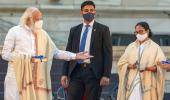'The regime -- and particularly the home ministry under Amit Shah -- have sought to suppress and destroy these struggles through intimidation, bullying, threats, through false cases, arrests, custodial torture, the use of draconian laws like the UAPA.'

"," Communist Party of India-Marxist Politburo member Brinda Karat tells Rediff.com's Shobha Warrier.
What do you attribute to the rise of right-wing politics in India?
Is it because of the slow decline of the Congress?
There is a definite rise in right wing politics, but let us not forget that in electoral terms, the majority of Indians voted against the BJP and its divisive agenda.
Let us also not forget that much of the BJP's electoral performance is backed by the huge and unprecedented flow of money from sources that remain unnamed by the opaque electoral bonds scheme.
This is legalised corruption -- which conceals the quid pro quos between the fund-givers and the BJP's financial, industrial and taxation policies.
India's ruling classes -- the big corporates, the rural elites -- have decided to back the Modi package -- false nationalism, the communal and divisive agenda, the unprecedented attacks on democracy and democratic rights, on trade unions and farmers struggles -- which provides for them a stable platform for profit maximisation.
Modi calls them the 'wealth creators' and for him the real producers of wealth -- the workers and farmers -- are anti-national terrorists.
The decline of the Congress is certainly one factor.
The lack of a consistent ideological response from the Congress which is still the largest national Opposition party, to the politics of the BJP and RSS, its advocacy of soft Hindutva, has strengthened the right-wing shift in the setting up of political agendas.
This is symbolised by the absence of the word 'secularism' in Congress politics in the face of the all-out attack on the very concept of secularism by the BJP-RSS and their spokespersons.
In addition, on the economic front, the Congress governments had initiated and aggressively pursued the same policies.
The role of the regional parties is also very important.
Where they have taken a strong stand against the politics of the BJP, such as in Bihar or Jharkhand, the pro-democracy, pro-secular forces expand their political space.
How dangerous is it to not have a strong Opposition in the country?
The opposition to governments in not just through political parties, but also and equally importantly people's movements and mobilisations.
On the two most significant developments in the last year-and-a-half, it was not so much the Opposition parties, but the anti-Citizenship (Amendment) Act movement and now the farmers' struggles which have posed the greatest challenge to the Modi regime.
The regime -- and particularly the home ministry under Amit Shah -- have sought to suppress and destroy these struggles through intimidation, bullying, threats, through false cases, arrests, custodial torture, the use of draconian laws like the UAPA.
As far as the Opposition political parties are concerned, the absence of a sufficient number of Left MPs in Parliament has certainly weakened the opposition in Parliament.
The Left had always played the most significant role in raising real issues and people's voices in Parliament.
At present, with the suborning of almost all autonomous institutions to the agenda of the ruling party at the Centre, the use of central agencies to threaten and bully the Opposition is a common ploy used by the BJP to silence the opposition.
These are challenges which are real, but ways must be found through issue-based united actions by the Opposition in Parliament to resist the BJP.
Whom do you consider your rival in Kerala: The Congress or the BJP?
In the specific configuration of political forces in Kerala, the experience of the last five years shows that against the LDF (Left Demoratic Front), the UDF (United Democratic Front) and the BJP move in tandem, including in the transfer of votes in selective seats.
The challenge is to ensure their defeat with convincing margins.
Why do you think right wing ideology is gaining ground in many countries in the world?
The set of economic policies called neo-liberal policies paved the way for a huge increase in what Oxfam has described as the 'inequality virus.'
In the absence of strong left-wing organisations and parties, which had suffered a huge ideological and organisational setback globally with the demise of the Soviet Union and other socialist countries, conservative parties got a boost.
However, in the last decade, preying on the growing numbers of the unemployed and the subsequent discontent, extreme right-wing parties have occupied the space created, and diverted, what should be opposition to capitalism to manufactured political narratives based on racism, religion, Islamophobia, immigrants and so on.
The media and the growing control of the right-wing even over social media have greatly helped the growth of extreme right-wing forces.
But this is not one way.
Just as in India, the right-wing is being confronted by people's struggles, workers and peasants and across campuses, and young people raising the flag of resistance.
So also across the United States and Europe there is a discernible and positive trend towards resistance to neo-liberal authoritarianism represented by the extreme right wing forces.
Black Lives Matter became a metaphor of the fight against Trumpism and his defeat.
It has more than symbolic relevance in the fight against his buddy, Modi.
It shows that such extreme forces, no matter what their power, can be defeated.
Feature Presentation: Ashish Narsale/Rediff.com.










